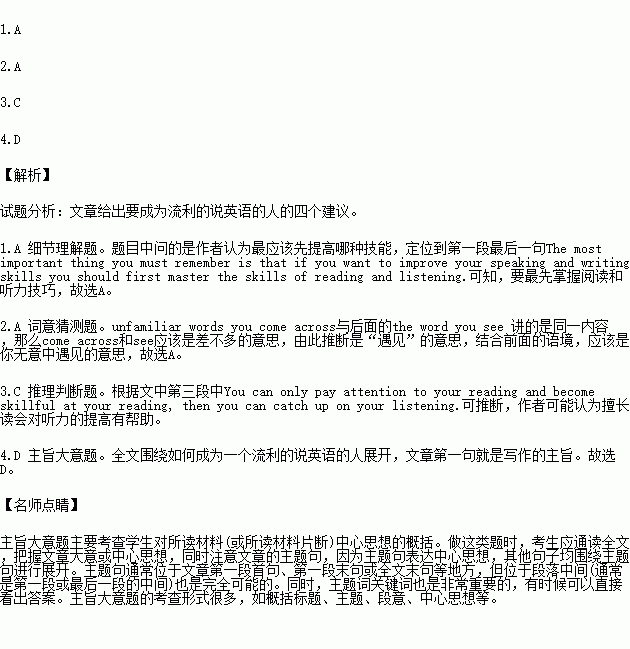题目内容
If you want to become a fluent English speaker you should take some advice: There are four skills in learning English. They are reading, listening, speaking, and writing. The most important thing you must remember is that if you want to improve your speaking and writing skills you should first master the skills of reading and listening.
Read as much as you can. But your reading must be active. It means that you must think about the meaning of the sentence, the meaning of the unfamiliar words, etc. There is no need for you to pay much attention to grammars or try to understand all the unfamiliar words you come across,but the fact that you see them for the first time and recognize them whenever you see them, for example, in other passages or books, is enough. It would be better to prepare yourself a notebook so you can write down the important words or sentences in it.
As for listening, there are two choices: besides reading, you can listen every day for about 30 minutes. You can only pay attention to your reading and become skillful at your reading, then you can catch up on your listening. Since you have lots of inputs in your mind, you can easily guess what the speaker is going to say. This never means that you should not practice listening.
For listening you can listen to cartoons or some movies that are specially made for children. Their languages are easy. Or if you are good at listening you can listen to VOA or BBC programs every day. Again the thing to remember is being active in listening and preferably taking some notes.
If you follow these pieces of advice, your speaking and writing will improve automatically, and you can be sure that with a little effort they will become perfect.
1.According to the author, which should you improve first among the four skills?
A.Reading and listening.B.Reading and writing.
C.Writing and speaking.D.Speaking and listening.
2.The underlined phrase “come across” in the second paragraph can probably be replaced by “________”.
A.meet by accidentB.discover
C.find on purposeD.look for
3.The author seems to agree with the view that ________.
A.everyone should listen to VOA or BBC programs every day
B.you needn't practice listening if you keep on reading every day
C.being good at reading is helpful in improving your listening
D.you should take notes of whatever you are hearing
4.The passage is mainly about how to ________.
A.choose suitable listening materials
B.deal with new words in reading
C.improve your English as quickly as possible
D.become fluent in speaking and writing English
 阅读快车系列答案
阅读快车系列答案
